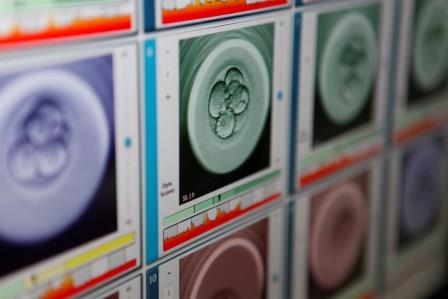
It is a unique and pioneering project in this area in Spain
- The study aim is to determine the involvement of several genes in the early stages of human embryonic development.
- To achieve this goal, Dr. Veiga's team will modify these genes by the genetic editing technique CRISPR/Cas9, and they will study the development of the edited embryos.
- This is a unique and pioneering project in this field in Spain, which will provide very relevant information to understand the early development of human embryo, and potentially improve assisted reproduction techniques.
Barcelona February 10, 2020. Characterization studies of early embryonic development are limited, mainly due to the lack of samples and the obvious legal and ethical limitations. The genetic edition technique CRISPR/Cas9 could be a very strong tool to deepen in this knowledge. This technique acts as directed scissors that modify specific DNA sequences or genes. The CRISPR/Cas9 technique has potential in the treatment of single-cell mutation diseases, because it can be used to eliminate or repair mutated genes in embryos, and thus prevent the birth of children with genetic pathologies.
Its application is also useful to study the role of genes in embryonic development, as in the study proposed. However, there are still technical limitations for these applications. On the one hand, it is necessary to modify all embryo’s cells and avoid what is called embryonic mosaicism - the mosaic embryos are those that have cells with a correct number of chromosomes and others chromosomally altered-. Also, there would exist the risk of altering other genes apart from the gene of interest (what is called off-target mutations), which could lead to significant side effects.
The research group of Dr. Anna Veiga, the principal investigator of the Regenerative Medicine Program of the Bellvitge Biomedical Research Institute (IDIBELL) and director of R&D in Biology of the Reproductive Medicine Service of Dexeus Mujer, is starting a project called "Genomic edition through CRISPR/Cas9 in human embryos for the study of early embryonic development. EMBRYOCRISPR". In which, through genetic edition by CRISPR/Cas9, several genes that have a capital importance in embryonic development will be studied. The project will consist of the development of genetic edition by CRISPR/Cas9 in human embryos, to modify some of these genes, and evaluate the evolution of edited embryos in the early stages of embryonic development.
In this project will be used human embryos from the In Vitro Fertilization Program of the Dexeus Mujer’s Reproduction Medicine Service, these embryos are from in vitro fertilization (IVF) cycles carried out in this center, that have been voluntarily and altruistically assigned for research by their parents.
Another novelty of this project is the technique used for embryos observation, time-lapse. Which allows continuous and real-time observation of them and their development.
In this project collaborate cellular and molecular biologists from IDIBELL, who will perform genomic edition, and molecular and immunocytochemical analyzes of the edited embryos. Clinical embryologists with extensive experience in embryonic culture and preimplantation genetic screening techniques of Dexeus Mujer, who will assess the efficiency and safety of genomic editing in human embryos, by the analysis of its developmental capacity and characteristics.
A pioneering project that will provide essential data
It is a unique and pioneering project in Spain, which will require experience in assisted reproduction and genetic edition areas. The development of the CRISPR/Cas9 method in human embryos will confirm the results of previous studies, as well as evaluate and solve the technical problems that this technique currently presents. However, the study of the involvement of specific genes in the early stages of embryonic development will provide essential data to deepen in this knowledge, and to establish possible embryonic viability and implantation markers, which could contribute to improving the current results of assisted reproduction techniques.
The project has been authorized by the General Directorate of Health Regulation and Regulation of the Departament de Salut de la Generalitat de Catalunya after having received the approval of the Comisión Nacional de Reproducción Humana Asistida (CNRHA), that considers that there are no ethical, biological or legal objections that impede its development.


